Five certifications that did well in France in 2018
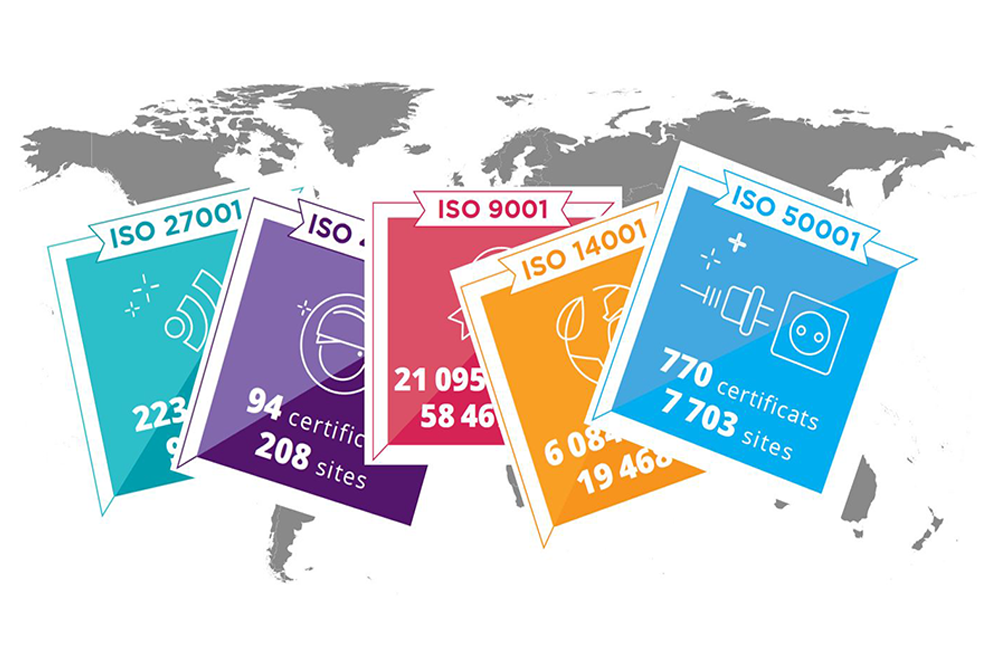
Against a backdrop marked by the transition to the new versions of ISO 9001 and ISO 14001, the International Organization for Standardization is highlighting the increase in the number of ISO 27001 (information security) and ISO 45001 (occupational health and safety) certificates awarded worldwide. A look back at the major trends in the 2018 edition of ISO Survey, which covers 12 major management system standards, and a focus on France.
1. Information security: ISO 27001 on top
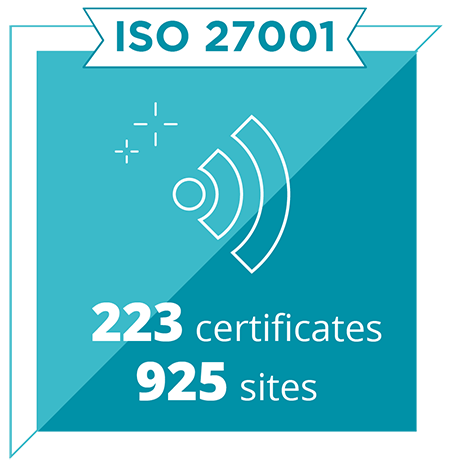
The RGPD effect is indisputable! Coming into force in May 2018, the European Data Protection Regulation has triggered a veritable rush to ISO 27001: three times as many certificates awarded to companies in France in 2018 as in 2017, many of them by AFNOR Certification, to reach 925 certified sites in France (and grouped under 223 certificates). The trend is mirrored worldwide, with the total number of certified sites now approaching 60,000, compared to 39,500 a year ago and just 10,000 in 2011. This is a sign that companies are becoming more aware of this fundamental issue. Very close to the requirements of the RGPD, ISO 27001, which provides guidelines for rolling out a good information security management system, is logically meeting with some success in European Union countries. More than a third of certificates are distributed at sites within the EU, well ahead of the performance of the USA, China and India.
2. Occupational health and safety: a successful start for ISO 45001
Another big trend in 2018: the strong start to the brand-new ISO 45001 occupational health and safety certification, based on the standard of the same name, published in spring 2018. There are already almost 12,000 certificates and over 14,000 certified sites worldwide, with France off to a more modest start with just 94 certificates, covering 208 sites. Like Axon Cable, certified by AFNOR Certification. This standard, which follows the same structure as other management system standards, is designed to help companies create better and safer working conditions for their employees and contractors. The construction (1,673 certified sites worldwide) and steel (1,078) sectors are logically the most in demand. China leads the way with 4,000 certified sites, followed by the UK (1,500) and Italy (1,400).
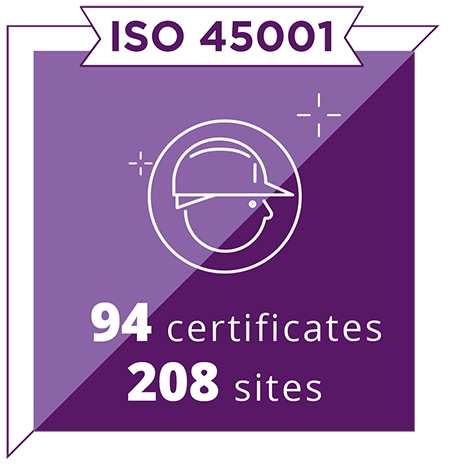
3. Quality management: the ISO 9001 guarantee
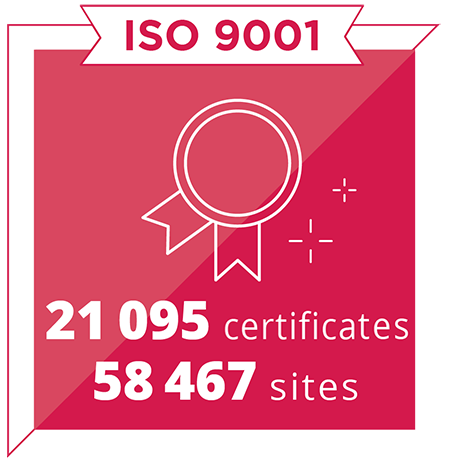
ISO 9001 remains the most widely used certification in all sectors. Nearly 1.2 million sites worldwide are certified to the 2015 version (the latest and now the only valid version) of this quality management framework, compared with 1.05 million in 2017. In detail, China leads the way with 297,000 certified sites, far ahead of Italy (126,000), Germany (73,000) and Japan (68,000). Spain rounds out the world’s top 5 by a narrow margin, ahead of France, in terms of number of sites. Other countries, such as India and the UK, are ahead of France in terms of number of certificates, but not in terms of number of sites, as one certificate can cover several sites (58,467 in France). Including CNES, AFAQ ISO 9001 and ISO 14001 certified by AFNOR Certification.
4. Environmental management: ISO 14001 a must
Environmental management, with ISO 14001, retains its position as the world’s second most frequently awarded standard. 447,000 sites were following its prerogatives in 2018, for example Orange France (French only), doubly certified AFAQ ISO 14001 and ISO 50001 (see point 5) by AFNOR Certification. I’m seeing an increase in the number of certified organizations in the construction, engineering services, information technology and real estate sectors,” explains Anne Benady, who monitors environmental issues for the AFNOR group. This indicates that they are taking greater account of their environmental impact… and that their customers are becoming more demanding! ” In France, 6,084 ISO 14001 certificates were active on December 31, 2018, covering 19,468 sites.
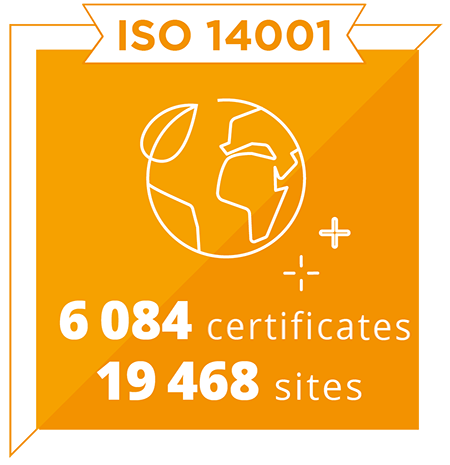
5. Energy management: mixed results for ISO 50001
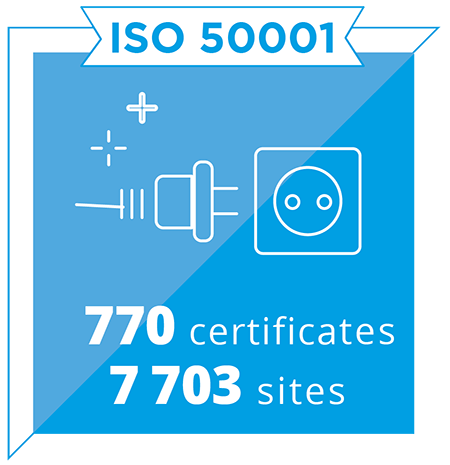
Indirectly linked to environmental issues, ISO 50001 and energy management continue to make steady progress worldwide. 46,000 sites are now certified worldwide, with Germany (14,000) and France (7,700) leading the way. In terms of sectors, it’s logical that industry – which consumes a lot of energy – should have the most certificates of this kind, particularly the food, chemicals and plastics industries.
But in France, ISO 50001 is marking time. While 938 companies were ISO-certified in 2017, there were just 770 in 2018 (for a total of 7,700 sites, that is). Including fire extinguisher manufacturer Desautel, (French only) following an AFNOR Certification audit of the 2018 version of the standard. This may be explained by a windfall effect,” says Béatrice Poirier, head of the Environmental Performance range at AFNOR Certification, who believes that there will soon be an upsurge in certifications. A peak was reached following regulatory measures granting a certain number of exemptions to companies on presentation of an ISO 50001 certificate. Once certified, some have chosen not to pursue this path. An unfortunate decision: we have just released a
study
underlining that an energy management system based on ISO 50001 has immediate effects on energy consumption by correcting obvious anomalies, but also long-term effects by maintaining efforts over several years.
Last but not least, 2018 will also be remembered for the burgeoning interest in ISO 37001, a new anti-corruption standard for which 1,500 sites worldwide have been certified (for a total of 389 certificates). And by the good health of ISO 22000 certification for food safety, fourth in the global hit parade, proof of the interest of professionals in this theme closely scrutinized by consumers (32,120 certificates worldwide in 2018, including 140 in France).
“Information systems: a real craze for ISO 27001
Michel Tudela, auditor for AFNOR Certification
 “Awareness of the need for information systems security certification is recent, but powerful. Recent cases involving the hacking of corporate computer networks and the theft of consumer data have put the spotlight on this crucial aspect: data is valuable, and everyone is affected. The echo given to the entry into force of the RGPD (European Data Protection Regulation) in May 2018 has contributed to this collective awakening. Excellent news for ISO 27001 certification, whose requirements largely mirror those of the RGPD. Certification is the key to compliance!
“Awareness of the need for information systems security certification is recent, but powerful. Recent cases involving the hacking of corporate computer networks and the theft of consumer data have put the spotlight on this crucial aspect: data is valuable, and everyone is affected. The echo given to the entry into force of the RGPD (European Data Protection Regulation) in May 2018 has contributed to this collective awakening. Excellent news for ISO 27001 certification, whose requirements largely mirror those of the RGPD. Certification is the key to compliance!
This is a highly technical text, which covers all issues relating to information systems in organizations. The entire path of customer and internal information, its use, and the changes it may undergo, are scrutinized by this certification, which is based on four pillars: availability, integrity, confidentiality and traceability. This explains why ISO 27001 certification has become so popular in recent months. No sector is immune. Information is everywhere. Guaranteeing its protection has become a strategic and economic challenge.
“OHS: raising awareness for ISO 45001
Béatrice Poirier, Head of the Environmental Performance range at AFNOR Certification
 “Previously, the British standard OHSAS 18001 was the benchmark for occupational health and safety. But since the publication of ISO 45001 in March 2018, economic players are clearly and massively turning to this international text. This standard is based on the same structure as ISO 9001 and ISO 14001, and is part of a worldwide trend, with the emerging issue of well-being in the workplace.
“Previously, the British standard OHSAS 18001 was the benchmark for occupational health and safety. But since the publication of ISO 45001 in March 2018, economic players are clearly and massively turning to this international text. This standard is based on the same structure as ISO 9001 and ISO 14001, and is part of a worldwide trend, with the emerging issue of well-being in the workplace.
In addition to caring for employees, the subject also represents a major economic challenge. Companies are well aware of this: creating good working conditions and preventing accidents and occupational illness are highly cost-effective, compared with the costs generated by a production stoppage following an accident. ISO 45001 makes these issues an integral part of corporate culture. All sectors are concerned. Their credibility and image are at stake. It’s also a way of preparing for the future: certification could one day be one of the prerequisites for responding to a call for tenders, for example.